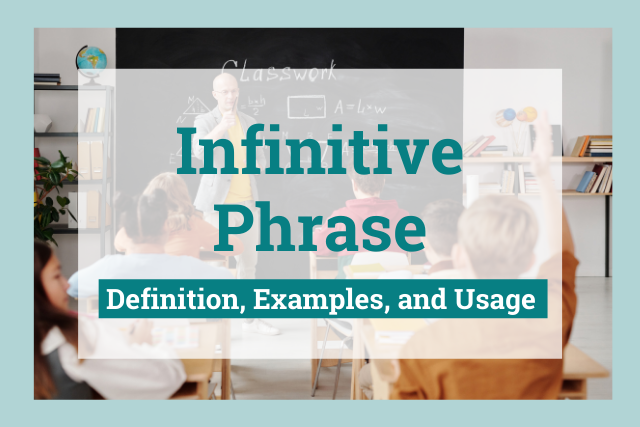
In the English language, we have many sentence elements, and they all have different functions. Infinitive phrases are a type of verb phrase that function as completely different parts of speech.
Today, we’re going to learn what an infinitive phrase is, what purpose it serves, and how to identify infinitive phrases in your writing.
What Is an Infinitive?
Before we can understand infinitive phrases, we have to know what an infinitive verb is. An infinitive verb is a type of verbal, which means a verb that functions as another part of speech.
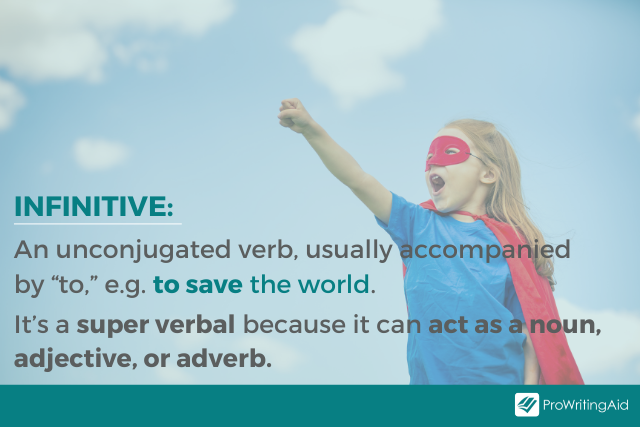
Infinitives are like a super verbal because they can function as a noun, an adverb, or an adjective!
Infinitives are the most basic, unconjugated form of a verb. When you look up a verb in the dictionary, you are looking up the infinitive form. Infinitives are usually paired with the word "to," as in "to play," but this isn’t always the case. We’ll talk more about that later in this article.
Infinitives are an example of non-finite verbs, which means that it will never be the main verb in a sentence. We also never conjugate infinitives by adding different endings. To be an infinitive, it must remain in its original form.
What Is an Infinitive Phrase?
An infinitive phrase consists of an infinitive verb plus any complements or modifiers. Complements are words that are needed for a phrase to make sense. In infinitive phrases, complements are usually direct objects.
Modifiers make phrases clearer or more specific. In an infinitive phrase, the modifiers might include articles, adjectives, objects, or adverbs.
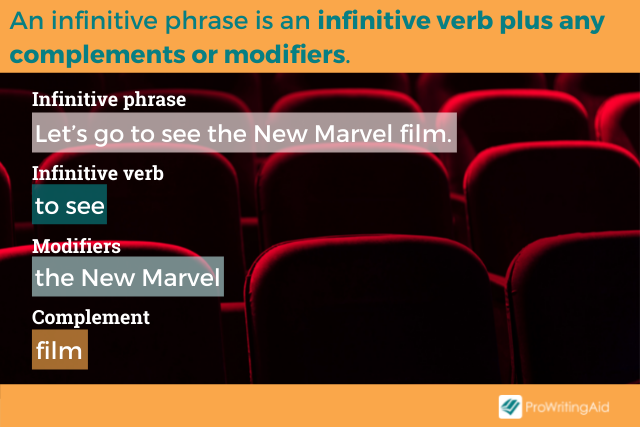
An infinitive phrase begins with the infinitive verb, usually with the word "to" in front. Here are a few examples of infinitive phrases:
- Peter loved to play guitar.
- I told the kids to dress quickly.
- Let’s go to see the new Marvel film.
In the first example, the infinitive "to play" is paired with a direct object: "guitar." Together, these make an infinitive phrase. The second example has an adverb ("quickly") modifying the infinitive "to dress." The third infinitive phrase has several words complementing and modifying the infinitive "to see."
Why do we use infinitive phrases? Infinitive phrases can add information or description to your sentences. They can strengthen your verbs and make your sentences clearer.
What Are the Infinitive Phrase Functions?
The infinitive verbal and, by extension, the infinitive phrase have three functions in a sentence. The infinitive phrase can act as an adverb, an adjective, or a noun in a sentence. Let’s look at each of these in more detail.
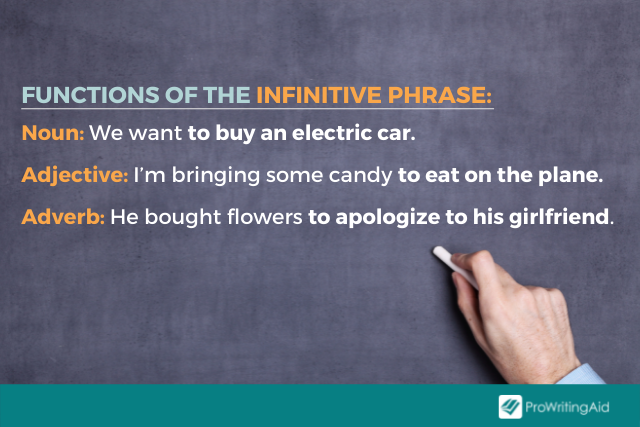
When an infinitive phrase functions as a noun, it can be a subject, an object, or a complement. Here are some examples.
- To win the tournament was our only goal.
- To know genuine love is the greatest achievement in life.
- On Saturdays, I help to clean up the park.
- We want to buy an electric car.
- My only responsibility was to cook dinner every Sunday.
In the first two examples, the infinitive phrase functions as the subject of the sentence. In example three, the infinitive phrase is "to clean up the park." It is acting as the direct object of "help."
The infinitive phrase also functions as a direct object in the fourth sentence. In the last example, the infinitive phrase is a complement to the linking verb "was."
Infinitive phrases can also act as adjectives. An adjective describes or modifies a noun. Let’s see what this looks like.
- I’m bringing some candy to eat on the plane.
- Some days, I have the urge to quit my job.
The infinitive phrase "to eat on the plane" modifies the noun "candy." "To quit my job" modifies the noun "urge." Because the infinitive phrases modify nouns, they are functioning as adjectives.
Finally, infinitive phrases can act like adverbs and modify a verb. Usually, when an infinitive phrase is functioning as an adverb, it explains the why of the verb. Here are some examples.
- He bought flowers to apologize to his girlfriend.
- We went to the concert to see our favorite band.
Why did he buy flowers? In order to apologize to his girlfriend. Why did we go to the concert? To see our favorite band. These infinitive phrases are modifying the main verbs, so they are acting like adverbs.
No matter their function, infinitive phrases will always include an infinitive plus its complements and modifiers.
How Do I Identify an Infinitive Phrase?
An easy way to identify an infinitive phrase is to look for the "to" and see if it’s part of an infinitive verb. Then you’ll look for all the complements and modifiers. But it’s not always that straightforward.
Sometimes an infinitive phrase won’t start with an infinitive like "to play" or "to go." It’s also easy to confuse infinitive phrases with prepositional phrases and adverbial phrases.
Let’s dive into some exceptions to the rule so you can learn how to identify the infinitive phrase in a sentence.
Can an Infinitive Phrase Have a Split Infinitive?
Split infinitives occur when words appear between "to" and the verb. You might remember the quote from Star Trek, "to boldly go where no one has gone before." The adverb "boldly" appears between "to" and "go." This is an example of a split infinitive.
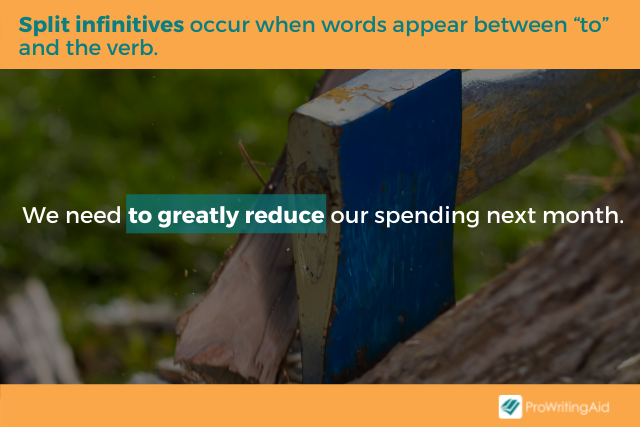
Split infinitives are one of those language features that are technically incorrect but are also perfectly acceptable in most situations. Sometimes an infinitive phrase only makes sense with a split infinitive!
Infinitive phrases can have split infinitives. Each of the infinitive phrase examples below features a split infinitive:
- I need you to quickly respond to this email.
- We need to greatly reduce our spending next month.
- The presentation needs to succinctly explain our metrics and goals.
Split infinitives aren’t bad and they can make your infinitive phrases clearer. Try to avoid them in technical writing, but they are acceptable in less formal situations.
Do Infinitive Phrases Always Start with "To"?
Looking for "to" is an easy way to identify an infinitive phrase, but sometimes it’s not there! A bare infinitive is an infinitive without "to." It appears after certain special verbs.
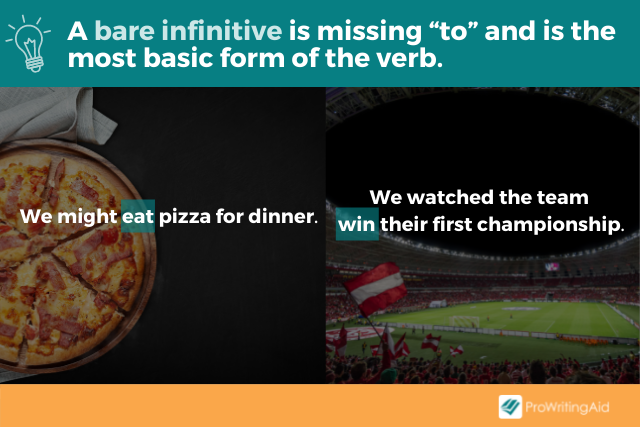
A bare infinitive might follow a modal verb, or helping verb. These include verbs such as may, might, could, can, will, and would. Here are a couple of examples:
- We might eat pizza for dinner.
- I can sleep late tomorrow!
A bare infinitive might also come after certain words that are followed by a direct object.
These special verbs include hear, feel, see, watch, let, help, and make.
The pattern followed by these phrases is: special verb + direct object + infinitive phrase.
This is what it looks like in a sentence:
- They let their son stay home alone.
- We watched the team win their first championship.
In the first sentence, the special verb is "let" and the direct object is "their son." The infinitive phrase has the bare infinitive "stay." The second sentence follows the same pattern. The special verb is "watched," the direct object is "the team," and the bare infinitive is "win."
What’s the Difference Between an Infinitive Phrase and a Prepositional Phrase?
Sometimes a phrase starts with "to" but isn’t an infinitive phrase! Prepositional phrases can start with "to" because it’s a preposition. Here’s an example of a prepositional phrase beginning with "to":
- I went to the store.
How do you know if something is an infinitive phrase or a prepositional phrase? Prepositional phrases do not contain verbs. Look at the words following "to." Is there a verb? If so, you’ve found an infinitive phrase. If not, it’s a prepositional phrase.
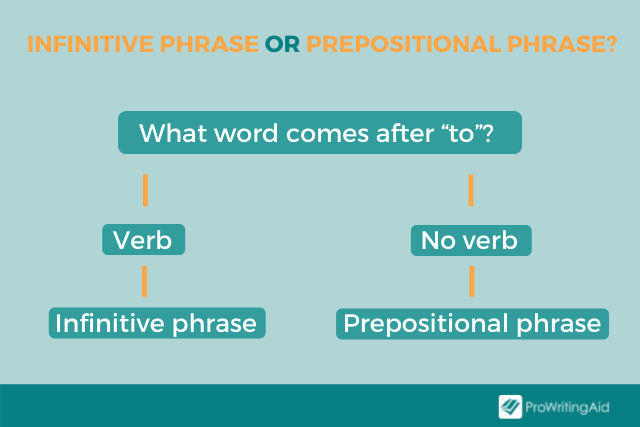
What Are Some Examples of Infinitive Phrases?
Let’s look at a few more examples of infinitive phrases.
- He called to say he was sorry.
- We felt the raindrops fall on our heads.
- Juan wants to propose to Jane soon.
- She said to clean the kitchen first.
- To fly a plane was on his bucket list.
Just remember, like any other grammatical construction, infinitive phrases can add variety to your sentence structure.
Good writers avoid falling into dull, repetitive sentence patterns by changing up the structure of their sentences. ProWritingAid’s Sentence Structure Report can help you with your sentence structure variety.
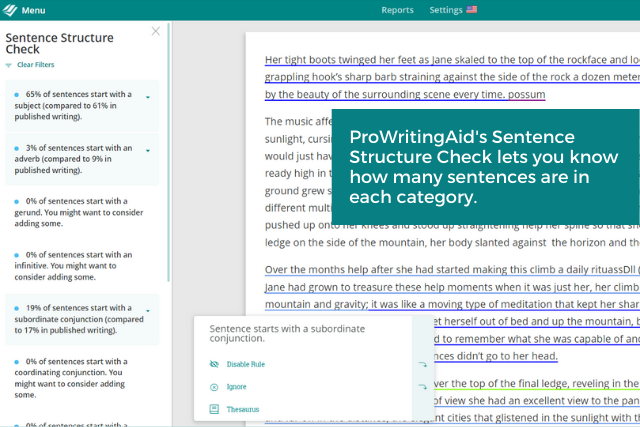
Sign up for a free account and see how it works for yourself.
Infinitive phrases are useful because they have so many functions and can enhance sentences in several ways. Now you can identify infinitive phrases in your own writing.


